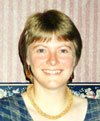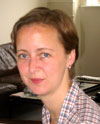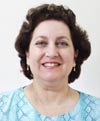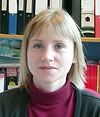 |
 |
 |
 |
 |
 |
|
|
||||
COLUMNS |
Contributors |
|||
 |
Mairi
MacDonald
Mairi taught English in Lithuania and Poland before returning to the UK to work in publishing. She has worked on several multimedia dictionary projects including the Macmillan English Dictionary on CD-ROM. Mairi works part-time as editor of History Online, a website aimed at secondary school teachers. The rest of her time is devoted to various ELT projects and developing learning materials for the web. |
|||
 |
Kerry
Maxwell
Kerry has a first degree in computational linguistics and an MA in theoretical linguistics from the University of Manchester, specialising in syntactic theory. For several years she worked as a researcher at Manchester and Essex universities, where in connection with European projects on machine translation, she was involved in computational lexicography, co-ordinating research in computational descriptions of compounds and collocations, and presenting her work in various international academic contexts. In 1993 she joined Cambridge University Press as a lexicographer/editor and grammar consultant, and worked on a large number of Cambridge learners’ dictionaries, including the English Pronouncing Dictionary, the Cambridge International Dictionary of Phrasal Verbs and the Cambridge Learner’s Dictionary in print and CD-ROM versions. In June 2001 Kerry moved to York where she now works as a freelance editor/lexicographer and is involved in a range of dictionary and grammar projects. |
|||
 |
Diane
Nicholls
I don’t know how or when I became a lexicographer, though I think I have always been a linguist. My first degree, in Russian and French at the University of Reading led on to a postgraduate diploma in technical and specialized translation from the Polytechnic of Central London. A long spell of working as a translator, freelance and in-house, brought me to the realization that my passion for languages lay in the individual words themselves rather than in any finished documents I might produce and that translating, while a great discipline, would never allow me the time to ‘enjoy’ the words. I returned to academic study and an MLitt in Slavonic Studies at Cambridge University. There I spent my time analysing and enjoying the language and style of the short stories of Anton Chekhov and wondering how I would ever manage to make a living using my language skills. Freelance work at Cambridge University Press provided the answer and my first non-user experience of dictionaries. It was through my work on False Friends for the Cambridge International Dictionary of English that I came into contact with the Acquilex project – an international computational lexicography project on multilingual lexical databases. Two years of working as a research assistant on Acquilex provided me with an excellent apprenticeship and finally sealed my fate (in career terms). Since the end of the Acquilex project in 1995 I have worked as a freelance linguist/lexicographer and revelled in the variety and flexibility this role offers. I have worked on highly commercial software development projects as far away as Silicon Valley in California, on academic research projects closer to home and in Hong Kong and the US and on a variety of dictionary publishing projects, including learner corpora, learners’ and native-speaker dictionaries and thesauruses (CUP, Bloomsbury, OUP, Macmillan). Among other things, I seem to have found a niche in developing and executing categorization and coding systems and can usually be found wading up to my neck in words, trying to marshal them into some sort of order while secretly admiring their slipperiness. Writing articles for the MED resource site provides me with an opportunity to get a few things off my linguistic chest and express some of my admiration for the things that words can do and the problems they can cause their users. I live in Hackney, London with my husband, Rory. |
|||
 |
Rosemary Richey is a freelance Business Competency Consultant for training and material development. With a MATESL from the University of Texas, Rosemary combined her eight years of hotel management with language teaching qualification to specialize in Business English training. She worked for four years at the British Council, Damascus doing both business and teacher training in Syria and Lebanon. Rosemary has been based in Munich, Germany since 2001. Dealing with in-house company training, she specializes in Customer Care, Human Resources/ Personnel, Company Finance and Hotels/Tourism. She is authoring English for Customer Care for Cornelsen Verlag in Berlin which is due out in autumn 2004. Rosemary is also a contributor to Macmillan's In-Company Upper-Intermediate Teacher's Book and onestopenglish website along with Business Spotlight magazine. You can contact Rosemary at rfhrichey@hotmail.com. |
|||
 |
Adrian
Tennant Adrian was born in Nottingham — home to Robin Hood — in 1966. After taking his TEFL Certificate he started teaching in Spain and has since lived and worked in France, Hungary, Ecuador and the UK. While he was working in Hungary he took his MEd on a distance programme with Sheffield University. In recent years he has run workshops and teacher training courses in the Czech Republic, Latvia, Lithuania, Hungary, Romania, Slovenia, Yugoslavia, Ukraine and Uzbekistan as well as in the UK. He has written web based materials for a number of Macmillan courses, including: Way Ahead, Smart, Prospects, Inside Out, Skyline, English Upgrade and the Macmillan English Dictionary and Macmillan Essential Dictionary He also regularly writes the Web Quest for the onestopenglish web magazine. He is also the materials advisor and co-author of three coursebooks — English Matters — written for schools in Uzbekistan. He is currently working part-time for New College Nottingham where, among other things, he is responsible for developing courses for non-native teachers on areas such as teaching ‘culture’ and ‘materials design’. He also works as a freelance teacher trainer. |
|||
| Meet the Editor | ||||
 |
Kati
Sule
Kati was born in Hungary. She studied English Language and Literature at the University of Szeged in south-east Hungary and also completed an ELT degree, writing her dissertation on the role of monolingual dictionaries in ELT. She taught English as a foreign language in Hungary and briefly in the Netherlands. Kati has worked as an ELT editor since 1999. She has been involved in the Macmillan English Dictionary and Macmillan Essential Dictionary projects, and was editor of the Macmillan English Dictionary Workbook. She has also worked on the CD-ROM edition of MED and Essential, and is one of the editors of the Macmillan English Dictionaries resource site. |
|||
|
Cover illustration by Julian Mosedale |
||||
|
|
||||